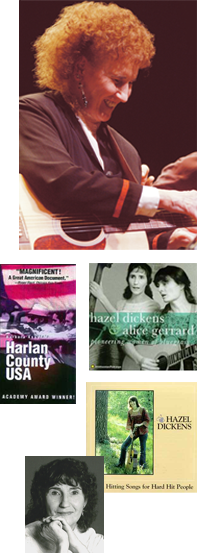Hazel Dickens
1935-2011, Montcalm, Mercer County
Hazel Dickens was born in southern West Virginia near the coal mining community of Montcalm, in Mercer County. Many of her original songs champion women’s rights and the plight of non-unionized mineworkers. An icon of West Virginia music, she stayed true to her West Virginia roots and her songs, voice and spirit have left an indelible mark on the face of American music.
Dickens was one of 11 children, and her father, a disabled jack-of-all-trades, struggled to make ends meet. Several of her brothers went to work in the mines, and Dickens was deeply affected by what she saw of the lives of working men and women in a coal town. When the mines began to close in the 1950s, she joined other family members in the Baltimore area where she worked a series of factory jobs. Homesick, she returned to West Virginia often, staying in touch with family and trying to adjust to life in the city. These feelings and experiences made their way into her songs.
Around 1954, Dickens met musician and folklorist Mike Seeger and, through him, became acquainted with other area musicians. While most were from urban backgrounds, all shared a love of traditional country and bluegrass music. She soon joined the Pike County Boys, playing bass and singing harmony in honky tonks and bars around the Baltimore area. While there, she met singer and guitarist Alice Foster (now Alice Gerrard) and the two women began performing a mix of early country duets, hardcore bluegrass and original music. Their 1965 album for the Folkways label became a landmark recording for its powerful presentation of women in bluegrass music.
Moving to Washington, D.C. around 1970, Dickens became increasingly involved in movements for workers’ rights, women’s rights, and mining issues. Some of her original songs such as “Working Girl Blues,” “Black Lung,” “Coal Miner’s Grave” and “They’ll Never Keep Us Down” express her concerns. By 1980, Dickens began recording for Rounder Records. Her recordings have proven to be tremendously influential, and her songs have been recorded by artists including Dolly Parton, The New Riders of the Purple Sage and Hot Rize. Her song “Mama’s Hand,” recorded by Lynn Morris, was named the 1996 “Song of the Year” by the International Bluegrass Music Association.
In addition to recording 11 albums, Dickens contributed to the soundtracks of nine feature films, including Matewan and Songcatcher. She was awarded an honorary doctorate from West Virginia’s Shepherd College (now Shepherd University) in 1998 and was presented with the prestigious National Heritage Fellowship from the National Endowment for the Arts in 2001.
Her music also had a major impact on fellow West Virginian Kathy Mattea, who recorded two Dickens songs, “Green Rolling Hills” and “Black Lung,” on her 2008 release Coal.
One of Dickens’s best-loved and most requested songs is “West Virginia, My Home.” Though she lived away from home for much of her life, she always remained a true-blooded West Virginian at heart.
Hazel Dickens died in 2011 from complications of pneumonia.
